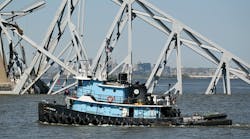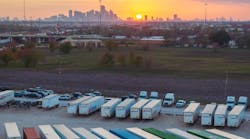The need for better cargo security for both domestic and international freight remains a top priority in the minds of government and transportation executives alike – and both plan to push for greater cargo security efforts next year.
“A new Congress is already preparing the debate over problems we face at home and abroad, at our ports and in the containers that bring us the consumer goods that drive our economy,” said Charles Raymond, chairman, president & CEO of NJ-based Horizon Lines, a domestic and global container-shipping firm. “You will hear a lot about 100% [container] inspection. You will listen to talk about the many challenges we face in international port security. I hope we will begin to see some real results.”
Michael Chertoff, secretary of homeland security, emphasized the need for more cooperation between the public and private sector on trade security during his keynote address to the Grants & Training 2006 National Conference in Washington, D.C., on November 28.
“Effective preparedness requires teamwork across all levels of the government and society, and it requires joint planning, coordination, training and execution,” he said. “We have to have a common approach, a coordinated approach, across all of the phases of what we have to do to create homeland security – prevention, protection, response and recovery.”
Improving risk management is the “core principle” around which better trade security and, by extension, better U.S. security is built, Chertoff said.
“It is a recognition of the fact that management of risk is not elimination of risk. There is no elimination of risk in life and anybody who promises every single person protection against every threat at every moment in every place in the country is making a false promise,” he stressed.
“What we do have to do is identify and prioritize risks – understanding the threat, the vulnerability and the consequence,” Chernoff added. “And then we have to apply our resources in a cost-effective manner, using discipline and common sense in order to minimize the risk without imposing undue cost on our communities and our families.”
Horizon Lines’ Raymond echoed Chertoff’s comments, adding that greater cooperation between all segments of the container industry and the government will be needed to achieve real results in trade security next year.
“The industry needs to come together – shippers, carriers and labor – to educate Washington on information technology and processes already in place that can improve trade and port security,” he said during a speech to U.S. Merchant Marine Academy alumni.
“The good news about trade security is that effective solutions exist today,” Raymond said. “Technology exists that can make trade safer and more efficient,” he said, pointing to an intermodal active radio frequency identification (RFID) system Horizon developed on its own to provide end-to-end real-time shipment visibility on its Alaskan trade routes. “To us, that represents the next great innovation in container shipping,” Raymond added.


